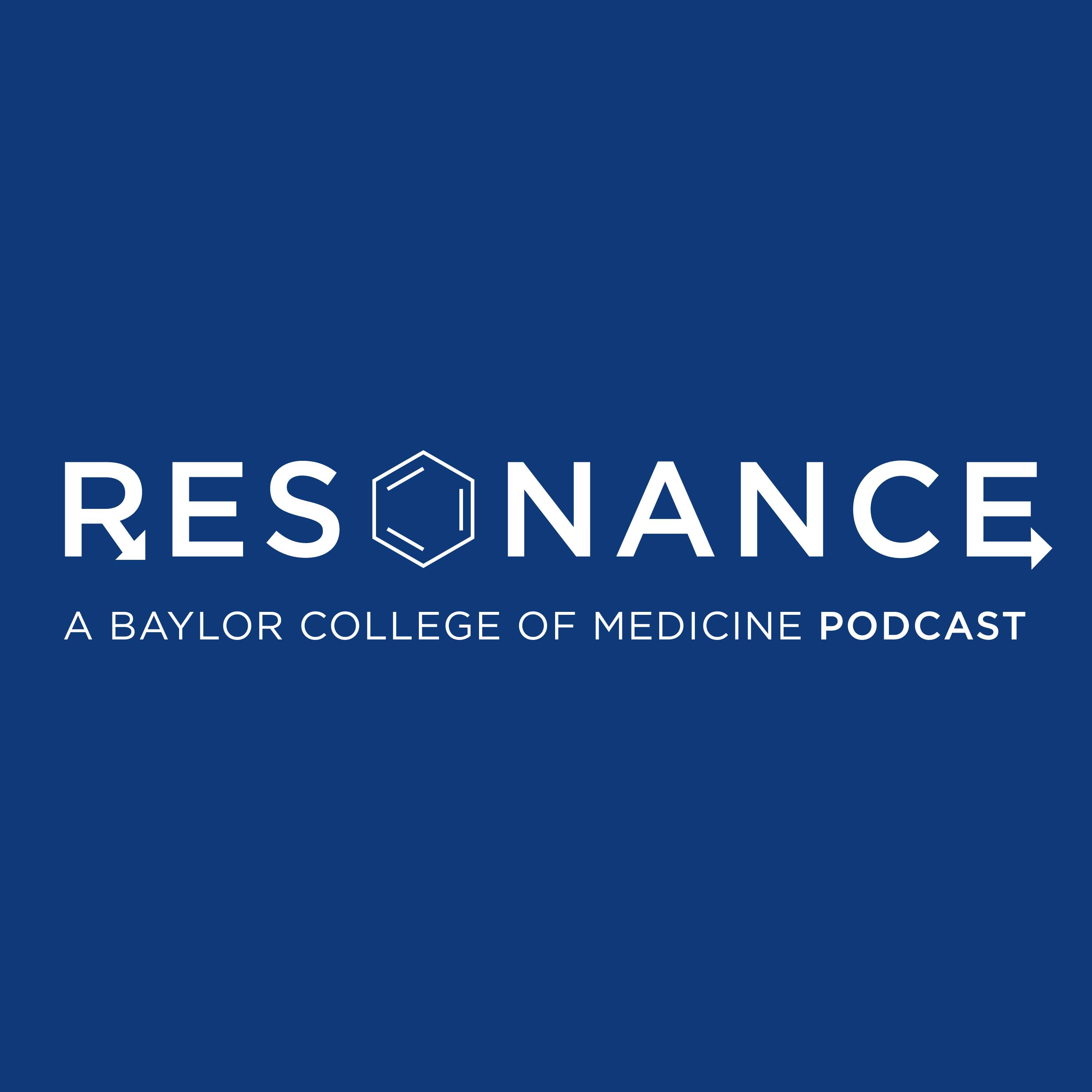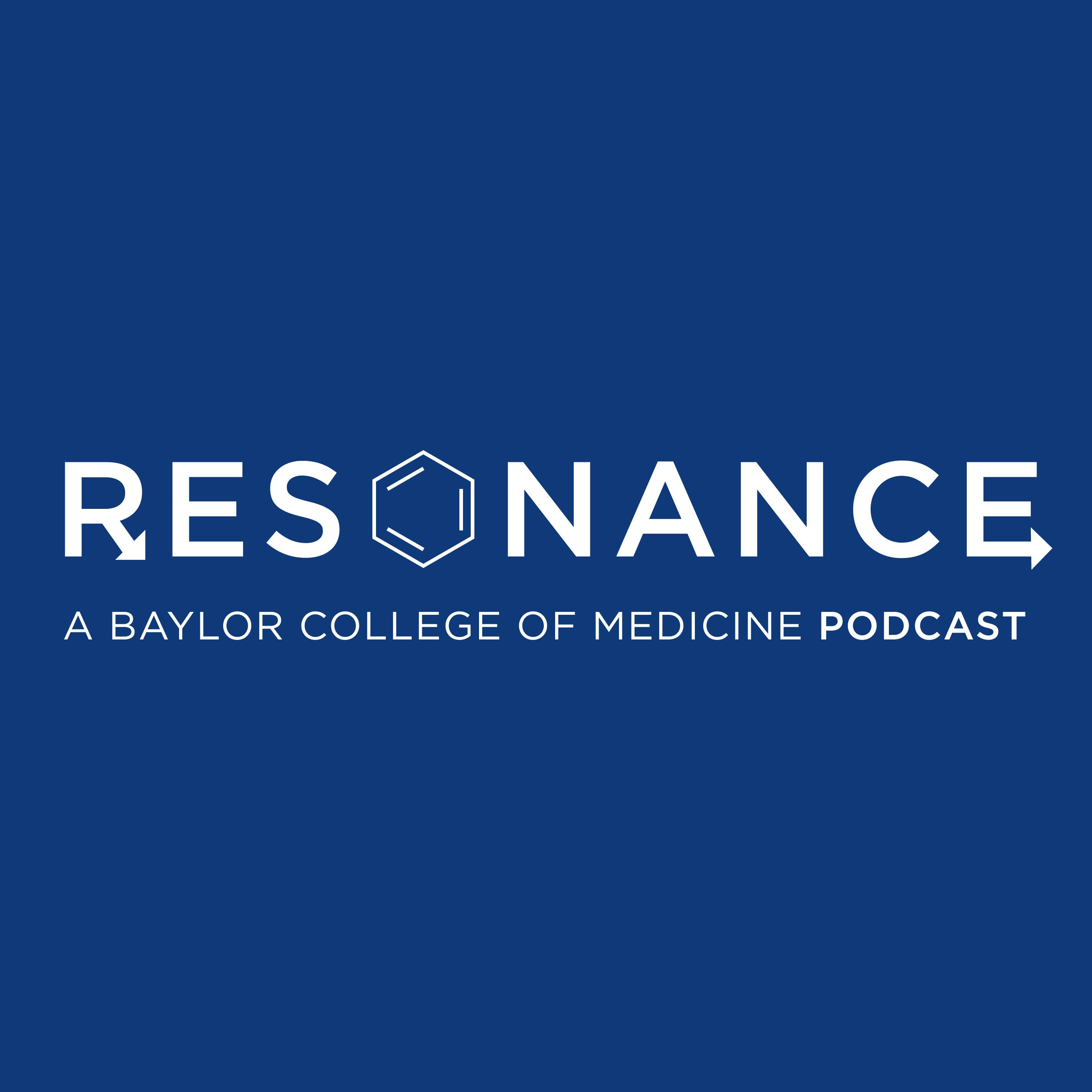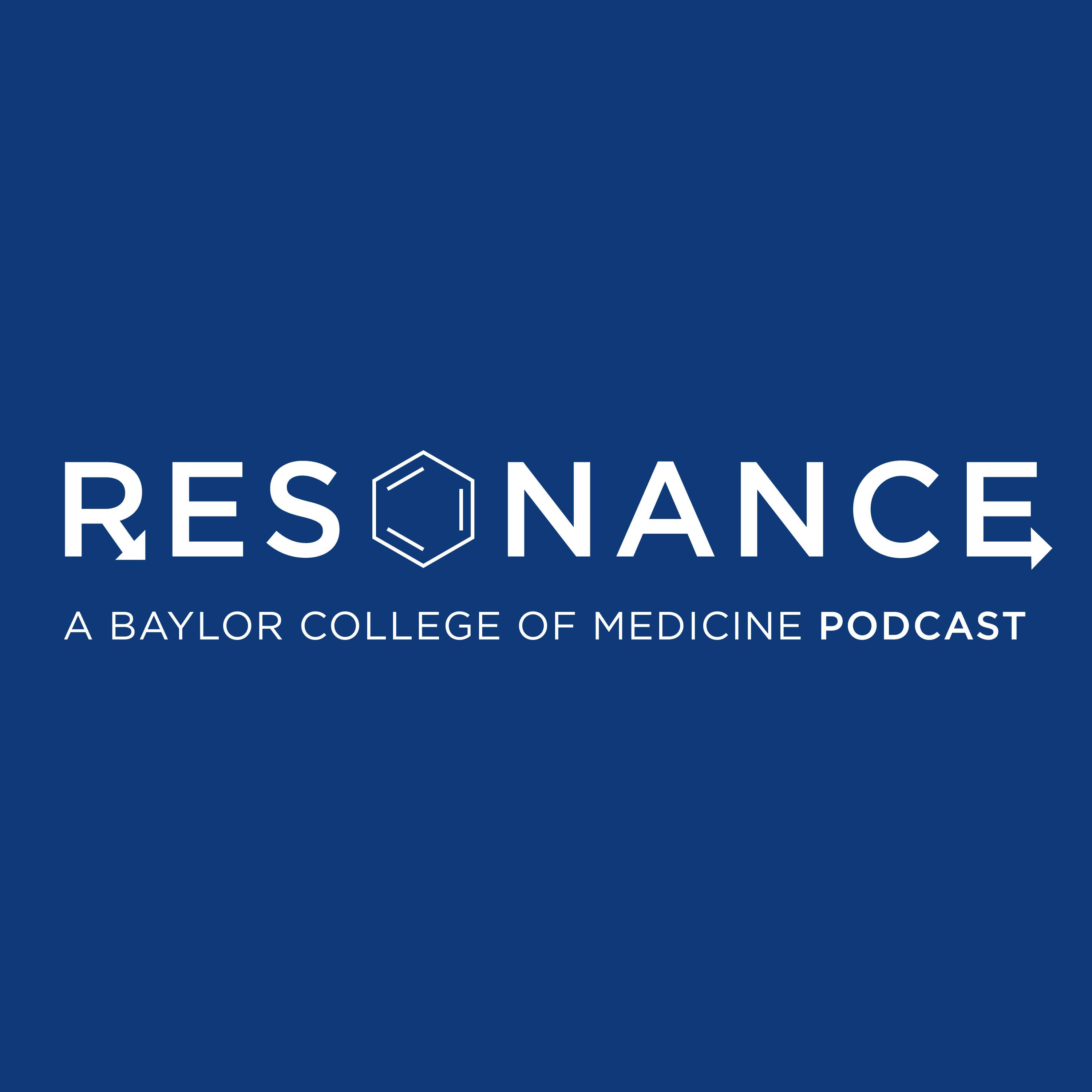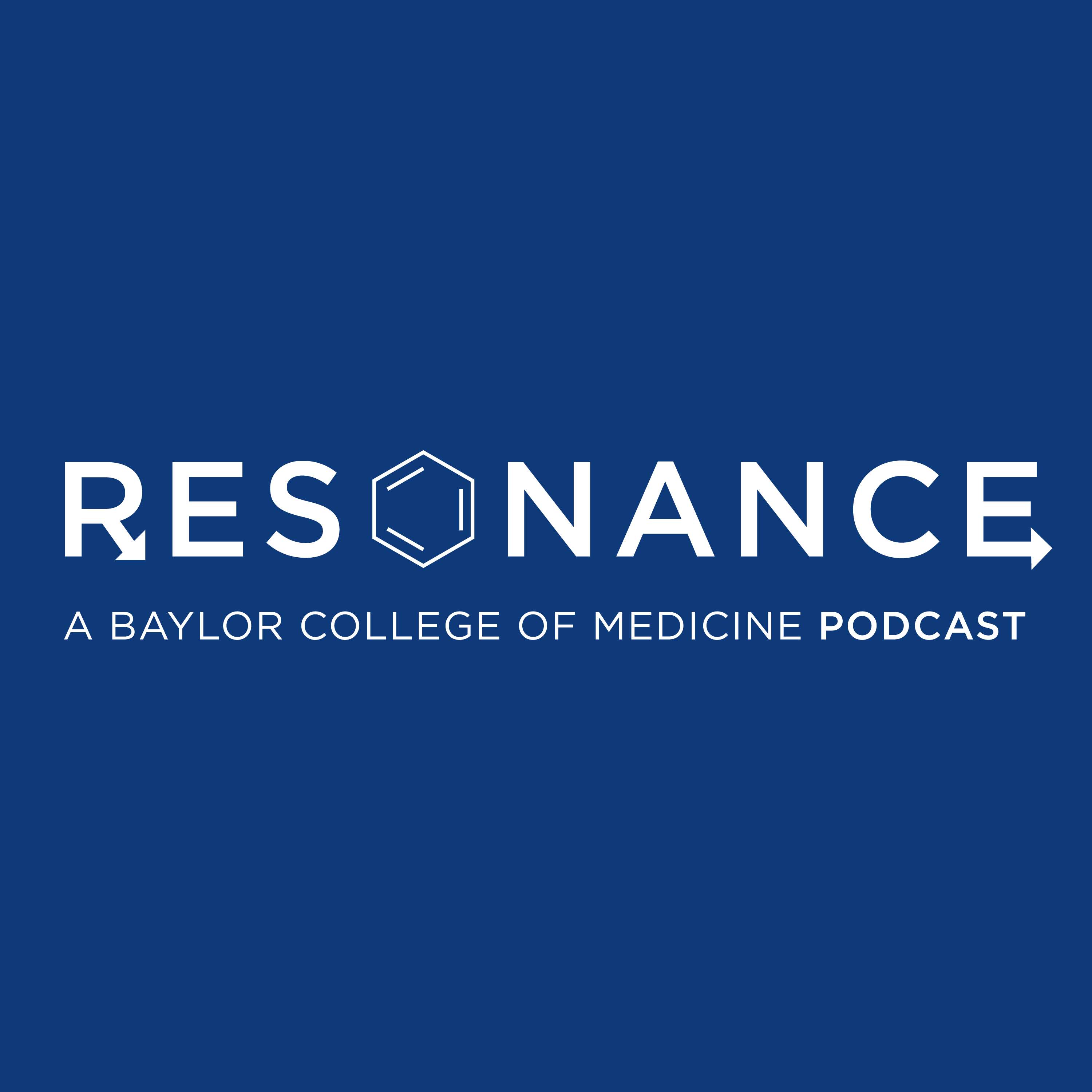Discover Resonance - A Baylor College of Medicine Podcast
Resonance - A Baylor College of Medicine Podcast

Resonance - A Baylor College of Medicine Podcast
Author: Baylor College of Medicine
Subscribed: 10Played: 273Subscribe
Share
© 2024 Baylor College of Medicine
Description
The Baylor College of Medicine Resonance Podcast is a student-run podcast aimed at showcasing the science at Baylor through the eyes of young professionals. Each episode is written and recorded by students who have a passion for research and the medical community. Guests on the show include both clinical and basic science research faculty who are experts in their fields. We hope that whoever listens in gains new insight into the exciting world of biomedical research.
48 Episodes
Reverse
Gianmarco Calderara:Hello, and thanks for listening to Resonance podcast, a podcast run by medical and graduate students at Baylor College of Medicine, where we interview clinicians, faculty, and researchers about their work in an effort to promote health, education, and ingenuity. My name is Gianni Calderara. I am a fourth-year medical student at Baylor College of Medicine, and I'm going to be co-hosting this episode today with my co-student and one of my close friends, Ryan Sorensen. Ryan Sorensen: Nice to join you today, Gianni. Gianmarco Calderara:Ryan is going to be leading us through a conversation with Dr. Andrew Lee. I'm just going to give a brief introduction to Dr Lee. So, Dr Lee is the Herb and Jean Lyman Centennial Chair in Ophthalmology, and he's also the founding Chairman of the Blanton Eye Institute, Department of Ophthalmology at Houston Methodist Hospital. He's also a professor of ophthalmology, neurology, and neurosurgery at Weill Cornell Medicine, and an adjunct professor of ophthalmology at Baylor College of Medicine, Texas A&M, The University of Iowa, and the University of Buffalo. Dr. Lee has been an American Academy of Ophthalmology member for over 25 years. He has served in various leadership roles. He's also a past president and current chairman of the board of the North American Neuro-Ophthalmology Society. He's authored over 500 peer-reviewed publications, has written a few textbooks, and has given a whole bunch of named lectures. He also has a very large YouTube presence with over 80,000 subscribers. So, Ryan introduced me to Dr Lee. Ryan, could you tell us a little bit about how you first met Dr. Lee and sort of how this podcast came about? Ryan Sorensen:Yeah, Dr. Lee is one of my mentors. I'm interested in ophthalmology, and he's a neuro-ophthalmologist. I met him my first year of medical school, actually at an event that he was presenting on building our brand for residency applications, which is thesubject of our podcast today. And since then, I've been on multiple research projects with him and helped with his YouTube channel. It's really been a pleasure to get to work with him over the years, and I'm really grateful to have him as a mentor. Gianmarco Calderara:Yeah, and like Ryan said, this episode is going to be all about preparing for residency applications, which are coming up later in the fall. Dr. Lee's going to be talking to us sort of about building our brand for residency and how we can sort of sell ourselves to programs and what we want our message to be, and how we can go about conveying that message in the best way possible. I'm excited to hear from him, and I think it'll be a good episode. So, without further ado, let’s hear from Dr Lee. Ryan Sorensen:All right, let's get to it. Gianmarco Calderara:All right. Well, Dr Lee, thank you so much for being here and agreeing to do this with us. I was really excited to hear about this topic from Ryan because I know applications are kind of, you know, around the corner, and I'm very excited for my own personal learning and some strategies I'm going to get just from a personal point of view. So, thank you so much for being here and taking the time to do this with us. Dr. Lee:Thanks for having me. Ryan Sorensen:Yeah, we're excited. We were just going over the introduction earlier, and I told Gianni that this is a really special opportunity for both of us just to sit down with you and get some insight into applying to residency programs. So, if you don't mind, we'll just get right into the questions. First, if you can just introduce yourself and tell us a little bit about what got you interested in ophthalmology and how you ended up in Houston. Dr. Lee:So, I'm from Charleston, West Virginia, but I went to the University of Virginia for medical school and college, and then I chose to come to Houston for residency. I was at Baylor College of Medicine for ophthalmology residency and was the chief resident. And in my chief year, my chairman decided that I would come back and join the faculty when I finished at Johns Hopkins in neuro-ophthalmology. And so I did. I was on the faculty at Baylor for 10 years, and then we were 10 years at the University of Iowa before we decided to come back to Houston, and I became the Chair of the Blanton Eye Institute here at Houston Methodist Hospital. Ryan Sorensen:All right, thank you. Can you tell us a little bit about why you're interested in academic medicine and why you chose to do academic medicine over private medicine? Dr. Lee:So I think, like most people who choose academics, you're going into it for clinical care, education, and research. But for me, the thing that keeps me in academic medicine is getting the chance to work with wonderful young people like yourselves. And there's nothing more rewarding for a teacher than to see the success of their students, professionally and personally. And so that's what keeps me going every day and keeps me in the game. Gianmarco Calderara:And I know we talked a little bit about your YouTube channel that you have. I talked a little bit about how I watched some of those videos my first year of medical school. Where did that idea come from and how did that YouTube channel start? Dr. Lee:So, over the years I've learned that young people learn differently than when I was a medical student, and young people of today want things that are quick. They like video formats, they want the information now and on-demand, and they don't want to go to the library. And so for me, it was a learning experience of my own to reframe my teaching style to meet those needs of the modern learner, short, digestible video vignettes about focused topics that are less than three minutes. It turned out to be the most rewarding thing that I've done in the education space in a long time because that YouTube channel has 6 million views and 80,000 subscribers, which is way more than any paper or any book I've ever written in my whole career. Gianmarco Calderara:Yeah, yeah, that's awesome. Can you tell us a little bit about sort of your experience, you know, interviewing residency applicants and kind of just looking over applications over the years? Dr. Lee:So as an interviewer, what we're looking for is two things, "fit" and "fitness." They're not the same thing, even though they sound similar. Fitness is what you bring to the table as an applicant, your credentials, your scores, your grades, your CV, your extracurricular activities, and that determines your fitness. And because there are so many applicants to ophthalmology, almost everybody has fitness. What we're looking for in the interview is not fitness. We're looking for fit. And for fit, what we're looking for is alignment with our value system. But also, can I see myself working with this person every day for three years, and is this the kind of person that I would want to see out in the community and be proud of. So for me, our product in academics, and education especially, is people. And so what we're looking for is fit and a good product. Gianmarco Calderara:So I guess kind of what we're talking about today on this podcast is really fit. We're really honing in on how we can kind of optimize our fit as applicants. And I guess at this point, when you are, you know, applying, your fitnes...
In this episode, we sit down with Dr. Mollie Gordon, Assistant Professor in the Department of Psychiatry at Baylor College of Medicine and founder of the nation's first psychiatry fellowship dedicated to treating human trafficking survivors. Dr. Gordon shares insight from her research and advocacy efforts aimed at combating human trafficking, both domestically and internationally. She provides practical guidance on identifying victims of human trafficking as well as next steps for clinicians once a victim is identified.
Dr. Charu Agrawal is an assistant professor in the Hematology Oncology Department at the Dan L Duncan Comprehensive Cancer Center in Houston, Texas. In this episode, she shares her experience working as a palliative care physician and her journey through medicine. She discusses the challenges and rewards of palliative medicine while highlighting the importance of holistic end-of-life care.
In this episode, we talk to Dr. Nathan Lindquist, assistant professor in the Department of Otolaryngology – Head and Neck Surgery, about cochlear implants and his perspective on advancing the field of caring for patients with hearing loss. We discuss his journey to otolaryngology and neurotology, learn about cochlear implants, and look forward to the future work necessary to improve cochlear implant outcomes and increase access to hearing loss treatments.
Tune in to the latest episode of Resonance Podcast! Discover the untold healthcare challenges faced by incarcerated populations in conversation with McKenna and Justin from Baylor's Justice-Involved HEAL Initiative. Dr. Marc Robinson sheds light on the complexities of health care delivery in jails and prisons, advocating for humane treatment and societal perception change. Learn about the HEAL Initiative's student-led mission to educate and raise awareness among incarcerated individuals. Join the discussion on understanding incarceration as a social determinant of health. Don't miss this eye-opening and inspiring episode! #ResonancePodcast #JusticeInHealthcare #HEALInitiative #SocialDeterminantsOfHealth
In this episode, we speak with Dr. Laura Detti, the director of the Reproductive Endocrinology and Infertility (REI) department at Baylor College of Medicine. We discuss two of her major research projects: ultrasound measurements in detecting early pregnancy loss and using recombinant AMH for potential fertility preservation applications. We also hear about how she uses research findings to inform clinical practice, as well as exciting future research in the field of REI.
In this episode, we talk to Dr. Angela Catic, associate professor in geriatrics and associate chief of staff of education at the Michael E. DeBakey VA Medical Center, about her journey to geriatrics, her experiences as a medical educator, and the future of caring for older adults. We also talk about the interdisciplinary opportunities in geriatrics and her perspective on training the next generation of medical providers.
Dr. Wesley Boyd will share the milestones in his career that have accumulated into his current work in bioethics, humanities, human rights, and psychiatry. We will learn about the events that led him to co-found the Human Rights and Asylum Clinic at Cambridge Health Alliance. From there, we will discuss his continuous involvement in the advocacy of asylum seekers and the impact of his work on ensuring immigrants' and asylum seekers' plea for refuge and medical care is heard and answered.
Dr. Mariam Hull is a pediatric neurologist with a fellowship in movement disorders. She has been with Baylor for residency, fellowship, and now as an attending physician. Today’s discussion will include her experience training at Baylor, the field of pediatric neurology, her research and the implications of Covid-19 on movement disorders, and her personal take on wellness in medicine.
In this episode, we hear from Dr. Niraj Mehta, founder of the Cupcake Man Project at Ben Taub, pioneer of the physician-led physical exam rounds for the Internal Medicine clerkship, and personal advocate for the importance of preserving human connection in medicine. Over the next hour, he will discuss his initiatives and share his wisdom on the power of kinship in medicine, helping us make sense of what it means to heal and what we can do to build an intimate alliance with our patients and colleagues
In this episode, we speak with Dr. Jane Montealegre, the Deputy Director of the Office of Outreach and Health Disparities at Baylor College of Medicine. We learn about Dr. Montealegre’s work on cervical cancer screening and prevention, including her ongoing research on mailed, self-collected HPV testing kits. In this podcast, we explore the future of cancer screening and prevention, and how to better reach underserved groups.
Dr. Carolyn Smith will discuss her career path as a scientist as well as her time as Dean of the Graduate School of Biomedical Sciences at Baylor. Highlights will include her motivations for dedicating her time to graduate education, her goals as Dean, the challenges that COVID19 has posed to the graduate school curriculum/rotation schedules/ongoing student research, and her vision for the future of GSBS.
If you could live without one of your five senses, which one would it be? Does one sensory system take priority over the other? It turns out, these questions are not as straightforward…and the answers will surprise! Sensory processing or sensation makes up a huge aspect of human perception. Dr. Yau’s lab uses functional neuroimaging, noninvasive brain stimulation, computational modeling, and psychophysics to discern principles underlying the integration of sensory information which result in perception and how sensory network connectivity varies across tasks and brain states. In this episode, he discusses his academic journey, the clinical applications of his research, and the insights his efforts have yielded so far.
In this episode, we take an inside look at how Dr. Lehnhardt and his team of engineers are preparing the next generation of astronauts against the health hazards of space travel to the red planet. Dr. Lehnhardt shares his journey from his home of origin in Canada as an emergency medicine physician to spearheading the Human Research Project efforts in the Lonestar state, as a senior faculty at the Center for Space Medicine, and as an Element Scientist in NASA’s Exploration Medical Capability arm of the Human Research Program at the Johnson Space Center.
Dr. Goodell will discuss her research interests and her career path through the years. We’ll ask her about how she foresees her research on hematopoietic stem cell differentiation may impact future patient care. She’ll also discuss what she thinks comprises good science and any advice she has for aspiring researchers.
Dr. Richard Hamill will discuss his journey from teaching, to being the residency director of internal medicine at BCM. We’ll ask him about his experience teaching, his work, and his views of how medicine has and will continue to evolve.
Dr. Fields-Gilmore will discuss her work as a family medicine doctor. We will learn about Baylor College of Medicine's efforts in training compassionate physicians through the Compassion and the Art of Medicine Elective at Baylor and discuss what it looks like to be a compassionate health care provider. We will also take time to discuss community medicine and contrasting public vs private healthcare.
Phages or bacteriophages are bacterial viruses that can kill antibiotic-resistant bacteria. The use of phages to treat infections is called phage therapy. In this episode, Dr. Anthony Maresso an Assistant Professor in the Department of Molecular Virology and Microbiology and expert in bacterial pathogenesis will be discussing the work being done at Baylor to develop phage therapy for the most vulnerable patients. As well as his partnership with Dr. Barbara Trautner an infectious disease clinician and researcher at BCM and the Michael E. DeBakey Veterans Affairs Medical Center. She will be discussing her research into phage use for catheter-associated urinary tract infections. They will give their insight into the use of phages to combat the epidemic of antibiotic-resistant bacterial infections today.
Dr. Tolias will discuss his journey into artificial intelligence research and how he and his lab are developing cutting-edge algorithms from discoveries in neuroscience to better understand the brain’s perceptual inference and decision making, along with the many challenges. Dr. Tolias and his lab have one goal: to harness the algorithmic power of the visual system to generate the most cutting-edge algorithms to better analyze data and gain deeper insights into the mysterious and mathematical complexities of the most evolutionarily advanced sensory organ.
Dr. Kauth will talk about his research in LGBT Veteran health, involvement in LGBTQ advocacy, educational career, and trajectory. We’ll ask him about his involvement with the Montrose Center on the Board of Directors and current efforts to support the LGBTQ community. We will also discuss issues that members of the LGBTQ community have accessing proper healthcare and the role of stigma in quality of care.
Comments
Top Podcasts
The Best New Comedy Podcast Right Now – June 2024The Best News Podcast Right Now – June 2024The Best New Business Podcast Right Now – June 2024The Best New Sports Podcast Right Now – June 2024The Best New True Crime Podcast Right Now – June 2024The Best New Joe Rogan Experience Podcast Right Now – June 20The Best New Dan Bongino Show Podcast Right Now – June 20The Best New Mark Levin Podcast – June 2024
 United States
United States






